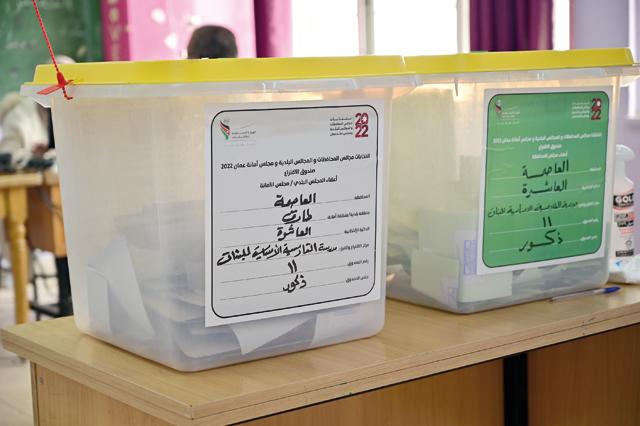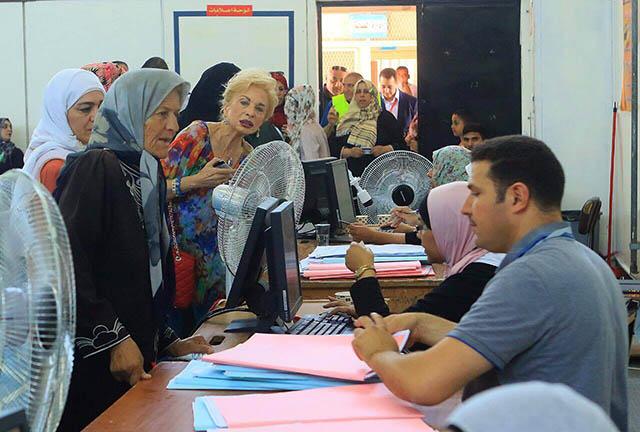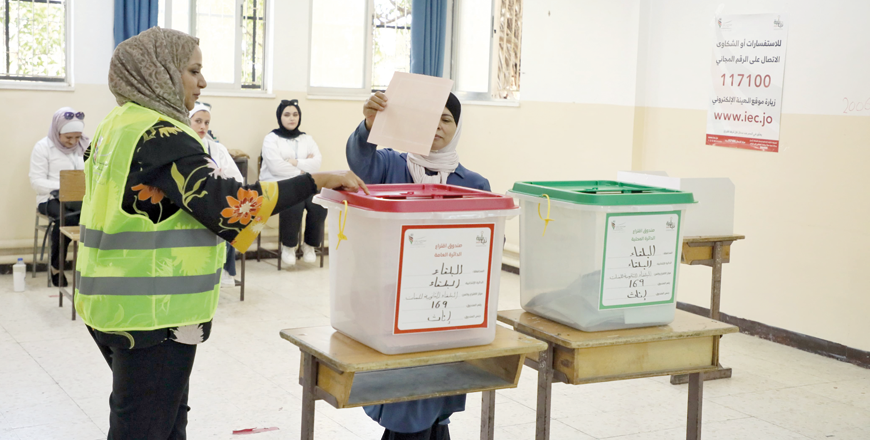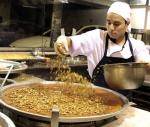You are here
Low turnout in local polls displays voter apathy, say political analysts
By Rana Husseini - Mar 23,2022 - Last updated at Mar 23,2022

Ballot boxes are seen at a polling station during the governorate and municipal council elections on Tuesday (Photo by Amjad Ghsoun)
AMMAN — Political analysts on Wednesday said that participation rates in elections in the Kingdom are still low, which reflects the voters’ apathy towards the elections.
The analysts were reflecting on the governorate and municipal council elections with a voter percentage of 29.64.
“Tuesday’s results reflect the decline in interest of most citizens in political practice and public life in Jordan,” said Director of the Phenix Centre for Economics and Informatics Studies (PCEIS) Ahmad Awad.
These rates reflect “the continued distrust of the political transition path among the majority of citizens”, Awad told The Jordan Times.
A total of 1,363,465 citizens cast their ballots, with 15.56 per cent male voters and 14.08 per cent female voters, according to the Independent Election Commission (IEC).
The total number of eligible voters was 4,602,135, of which 2,437,340 were women.
Participation rates in the municipal elections that took place in Jordan on Tuesday, which were close to 30 per cent, did not differ from the participation rates in the previous parliamentary and municipal elections, Awad explained.
Participation rates in the previous municipal elections amounted to approximately 32 per cent of those registered in the records, Awad added.
“The rates of non-participation at the governorate level also confirmed the continued reluctance of citizens in major cities to participate, especially in Amman, which is around 10 per cent,” Awad said.
This, Awad maintained, is attributed to the nature of the demographic composition of the capital, Amman, which is “not interested in political participation".
Former minister Samih Maaytah stated that the percentage of voters’ turnout was expected.
“The voting percentage was similar to the numbers during previous parliamentary elections, which means that voters’ convictions do not change quickly,” Maaytah told The Jordan Times.
Meanwhile, Maaytah maintained, the percentage in most governorates was high with the exception of Amman and Zarqa.
“The high percentage of voters in many governorates that reached around 62 per cent is a good indicator that can be used to build on in any future effort to encourage people to vote in the future,” Maaytah explained.
The highest voter turnout was recorded in Ajloun with 62.57 per cent, while the lowest was in Amman with 14.75 per cent, the IEC stated.
The percentage in the remaining governorates was as follows: Mafraq (61.08), Jerash (59.45), Maan (59.35), Karak (56.36), Tafileh (54.33), Madaba (45.92), Irbid (40.61), Balqa (37.12), Aqaba (33.21) and Zarqa (16.96).
But former information minister Mohammad Momani asserted that “we have to look at the percentage of participation in view of the fact that there are more than one million Jordanians living abroad or members of the armed forces and security agencies and are not allowed to vote”.
Momani said that following the monitors’ reports, domestic and international, it seems that the election process met the requirements of transparency and fairness.
“The credibility of the process has improved the percentage of participation slightly despite the boycott by the Islamic Action Front,” Momani told The Jordan Times.
This is a message to all political forces, including the IAF that “the way to solve our differences and our problems is through participation in the elections and engaging in public discourse and not shy away from that,” Momani added.
“No one seems to track any attempt to corrupt the elections and it seems that everyone is in line to give the election process credibility and honesty and that is the core of the national interest of the country,” Momani said.
But for Royal Committee to Modernise the Political System member lawyer Zaid Omar Nabulsi the absence of strong and entrenched political parties’ representatives in the elections means the election race remains “an exercise in futility”.
“Political life, of any kind, can only flourish and function with the existence of political parties that have strong programmes whereby the candidates will run under the banner of the parties and voters will select candidates based on their merits, and not their photos in the streets,” Nabulsi said.
Nabulsi told The Jordan Times that most candidates splashed their photos all over the streets but “failed to present any clear political background or constructive and realistic programmes that they can implement to serve the people”.
“We cannot reinvent the wheel of political life because there is no political life without real political parties,” Nabulsi concluded.
Related Articles
AMMAN —Voter turnout exceeded 16 per cent by 2:00pm, as some 690,000 voters casted their votes, the Independent Election Commission's (IEC)
AMMAN — The Independent Election Commission (IEC) on Wednesday announced the final results of the decentralisation and municipal elections.S
Islamic Action Front wins 31 seats from local, general lists, followed by Mithaq Party 21 seats; Irada Party 19 seats, Taqadum Pa














